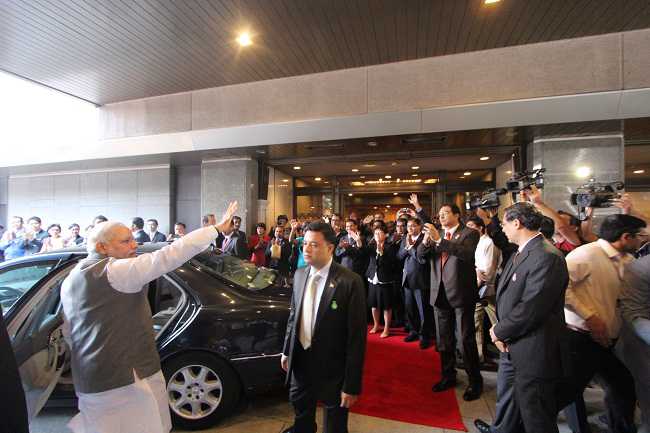By Arti Bali
New Delhi, Aug 22 (UNI) Amid growing strains in India–US relations, Prime Minister Narendra Modi will embark on a crucial diplomatic tour of two high-profile back-to-back visits including Japan on August 30 for annual talks with his counterpart followed by China for the SCO Summit from August 31 to September 1.
Prime Minister Modi’s decision to visit Japan signals a deliberate strategic shift toward East Asia and the growing depth of India-Japan relations. The diplomatic partnership of both the countries has evolved into a robust strategic alliance encompassing defense, trade, and investment. The India-Japan “special strategic and global partnership” enters its second decade of playing a key role in advancing a Free and Open Indo-Pacific (FOIP). As core members of the Quad, both countries are aligned in their vision for regional stability and a rules-based order. India’s upcoming role as host of the next Quad leaders’ summit further emphasizes its centrality in this framework, with attention on whether the US, amid trade tensions with India, will fully engage.
In this shifting geopolitical landscape which is marked by the thaw in India-China relations and broader regional recalibrations, Japan has always been a reliable partner in India’s Indo-Pacific strategy. Modi’s visit is not merely about infrastructure; it’s a calculated diplomatic move to reinforce India’s strategic autonomy and deepen cooperation with Tokyo across critical areas such as intelligence-sharing, semiconductor supply chains, rare earth minerals, and economic-security integration through the Quad.
Ultimately, the India-Japan partnership stands as a pillar of regional stability, rooted in shared democratic values and a mutual commitment to upholding a free, open, and rules-based international order.
Analysts are calling Prime Minister’s decision to visit Japan before China for the SCO summit a “masterstroke of diplomacy.”
The Japan Foreign Ministry has issued a statement, saying that PM Modi will pay an “official working visit” to Japan from August 29 to Saturday, 30 August 2025.
During his stay in Japan, Japan’s Prime Minister Ishiba Shigeru will hold a meeting and a working dinner with Prime Minister Modi.
Also, the two leaders will visit Miyagi prefecture.
The Government of Japan “sincerely welcomes the visit of the Prime Minister and hopes the visit will further strengthen the friendship and cooperation between both the nations”.
The Japan leg of the trip comes at a sensitive moment as trade tensions with Washington escalate after President Donald Trump imposed tariffs of up to 50 percent on Indian exports.
Geopolitical expert Zakir Hussein said, “The PM has killed multiple birds with one stone. First, it establishes India’s foreign policy independence, based on multi-engagement and multispectrum diplomacy.” He added that Modi’s outreach “sends a clear message to Beijing that India is not without options. Just as China engages Pakistan, India too has leverage by strengthening ties with Tokyo.”
New Delhi has also signaled to the Trump administration that India “is not an isolated power. It is a responsible, just and autonomous actor that cannot be subdued or unduly pressured,” Hussein noted.
Highlighting India’s independent foreign policy, he further observed, “The visit to Japan also demolishes the impression that India is aligning with China against the US. Instead, it shows that New Delhi builds relations on its own terms and interests. The mutual interests of both Beijing and New Delhi brought them closer—it is not one-sided.”
India has consistently emphasized the protection of “global commons” in the Indo-Pacific, where Quad cooperation remains vital.
Another significant dimension of Modi’s Japan visit is the potential signing of a “10 trillion yen (USD 68 billion) investment package for India. Such an agreement would showcase India’s resilience and strength in a turbulent global economy marked by wars, geopolitical rivalries, and instability.
“The prospect of signing a 10 trillion Yen (USD 68 billion) investment agreement with India answers all those who consider India a dead economy, as well as sends a clear message that the Indian economy is the shining economic spot in an uncertain world subject to war, geopolitical conspiracies, and instability,” Zakir Hussein said.
This uncertainty has cast a shadow over the Quad comprising India, Japan, the US, and Australia which remains a cornerstone of Indo-Pacific security. Against this backdrop, Modi’s outreach to Tokyo is both symbolic and strategically vital, signaling India’s intent to deepen ties with East Asia while recalibrating its position in a shifting multipolar order.
Zakir Hussein said, “India values the protection and preservation of the principles of “global commons” in the Indo-Pacific, where cooperation among the Quad members is necessary.”.
Faisal Ahmed, professor of international business and geopolitics at the FORE School of Management, said the visit will “strengthen bilateral defence partnerships and economic security.” He noted that it will also help both sides develop common positions in addressing regional and global challenges. A key strategic aspect that binds the two countries is their cohesive interactions to establish a rules-based regional order in the Indo-Pacific”.
He pointed out that there is a need to address “shared maritime challenges through interoperability mechanism and joint naval exercises such as the Malabar exercise.”
Faisal Ahmed listed out areas to deepen cooperation with Japan and said the partnership has indeed matured into a multidimensional relationship covering defense, trade, technology, and infrastructure, “Deliberations in defence equipments trade, technology transfer, and cooperation in military logistics is a strategic necessity for the two countries. Besides, a focus on non-traditional security issues through QUAD, development of high-speed rail network, supply chain resilience, cooperation in semi-conductors and critical minerals, and the ODA interventions are necessary pillars to strengthen this bilateral partnership.”
He pointed out India-Japan relations are about maintaining deeper ties that “need continuity and concerted efforts.”
UNI AAB RN


AloJapan.com